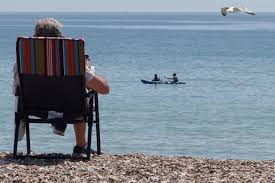31 March 2022
Doing Nothing
Has a natural attraction.
By John Watson

Frank Kelly, FRS, the erstwhile master of Christ’s College, Cambridge, is a mathematician with a difference. As well as holding the post of Professor of the Mathematics of Systems at the University’s Statistical laboratory, he is an engaging speaker who has the gift of making his subject clear to ordinary mortals. That is why I enjoyed listening to him some years ago, when a number of mathematical alumni were invited back to a day of lectures to celebrate the opening of a new centre for Cambridge mathematics. His subject was the mathematics of road systems. He had been Chief Scientific Adviser to the Department of Transport, after all, and he focussed on the fact that every road had a natural maximum capacity; as soon as that was exceeded, traffic jams would result. Congestion on the motorway was not always down to a slow lorry in the left hand lane or a country cousin creeping along in the middle. It happened automatically when the traffic capacity of the road was exceeded.
Those of you who expect me to dive off into clever mathematics and the niceties of fluid mechanics are in for a disappointment because the bit of the lecture which has remained with me is not the cause of this phenomenon but the reaction of the Minister when it was explained to him that the best way to keep a motorway running was to put a traffic light on each slip road and to use it to ration the entry of vehicles to make sure that the magic number was not exceeded.
“You see” said the Minister, “at the moment people accept motorway congestion as an inevitable fact of life, one of the things you just have to put up with as part of modern living. But if you have people stopped by traffic lights from entering a perfectly running motorway, they won’t regard that as a fact of life at all but will blame it on that idiot, the Secretary of State for Transport.”
Needless to say, that was the end of the traffic light idea. However, this article is not about traffic lights but rather about the temptation to do nothing, particularly when the advantages of action are uncertain. “Fools rush in where angels fear to tread” may originate in Alexander Pope’s An Essay on Criticism but it has been reused by everyone from Lincoln to Elvis and is embedded in our consciousness, particularly if we are timidly inclined.
Things do not normally get as uncertain as they are at the moment. There is a pandemic mutating its way around the world. Will the next mutation be the beginning of the end of it or something newer and deadlier altogether? The war in Ukraine shows no signs of coming to an end and will (or at least may) be followed by Western shortages of wheat, oil, gas, rare metals and goodness knows what else. Interest rates are likely to go through the roof to contain inflation. What business leader would want to place big bets in these circumstances? No wonder that merger and acquisition activity has more or less ceased. It would take courage to incur debt in expansion at the moment and many a manager will simply be focusing on how to make the business robust against forthcoming storms. When in doubt do nothing.
So far the overall performance of the stock-market has proved reasonably robust in the face of this cornucopia of shocks although, in comparing the FTSE’s current level of 7483 against the 7778 achieved in January and May 2018, one has to remember that no adjustment is made for inflation; but unless acquisitions revive, the current level will presumably begin to decline. A similar cloud must overhang the property market where uncertainty over interest rates will surely tempt some buyers to put off any action until things settle down. That does not lead to an immediate drop in price, of course, as sellers also decide to wait events; but whereas there will always be sellers, if only where people go into default or die, buying is a far more voluntary exercise.
Of course just as uncertain depresses markets, so they may revive as things settle down again and new patterns are established. Then that instinctive temptation to mitigate risk by doing nothing will be submerged by the risk of being left out. The trick of course is not so much to predict ups and downs but to call the timing. If you can get into markets at the bottom there will be killings to be made and to judge that bottom successfully we need to see past our natural reluctance to take action on the one hand and any inclination to take a punt on the other. That means ignoring the very things which make us human and is the reason why, for those of us who have any emotional feelings about our investments, there really is a very good case for delegating management to the professionals.


